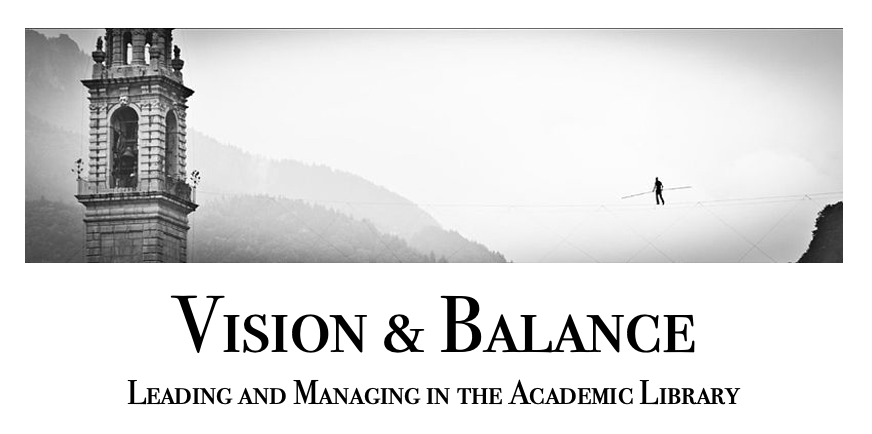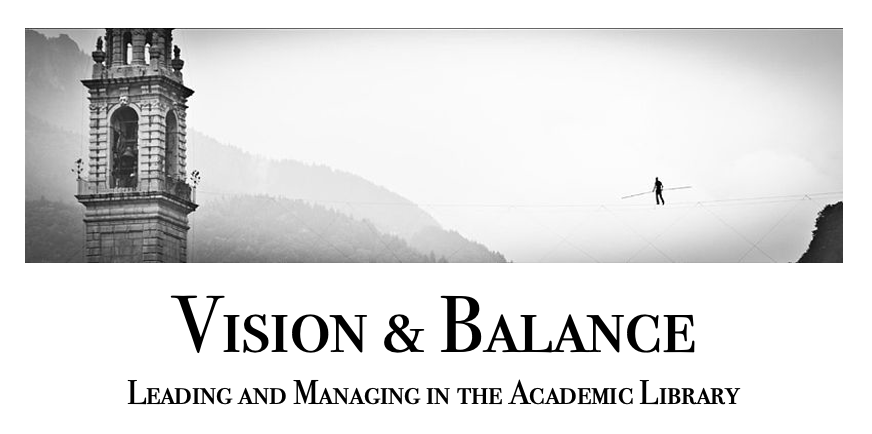Leadership and Natural Consequences
When an employee makes a mistake, a good leader doesn't clean up the mess for them.

One of the most common mistakes that leaders tend to make is rooted in some of our best human impulses. It is the mistake of stepping in and preventing the people we lead from experiencing the natural consequences of their mistakes.
Let me explain by way of an example – and not a hypothetical one. Indeed, this is one that many library administrators and managers have experienced directly.
A librarian – let's call him Gary – is interested in presenting a paper at a conference in Berlin, Germany. He prepares and submits a proposal, which is accepted. He then informs his supervisor – we'll call her Sarah – that he has had a paper accepted to the Berlin conference and that he will need travel support and someone to cover his regular workload during the week that he'll be away.
For the sake of this example, let's assume that the library where Gary works has clear policies and procedures in place for requesting travel support, and that these policies make clear that before submitting a presentation proposal to a conference, librarians must ensure that the necessary funding is available and that they can be spared from their regular duties during that time. (And yes, I realize that too many libraries don't have clear policies in place for such cases; that's a topic for another post. Or maybe a series of them.)
In this situation, Gary has made a significant mistake that has put him and the library in a difficult situation: he has made a commitment he was not authorized to make, and fulfilling that commitment will impact both the library's budget and the colleagues who will have to do his work while he's gone. However, failing to fulfill that commitment will be embarrassing both to him and to the library he represents.
This puts Sarah in a tough position, and she now has a difficult choice to make: will she allow Gary to experience the natural consequences of his mistake, or will she step in and prevent him from experiencing them? And what might be the knock-on effects of each of those approaches?
Let's consider the second approach (interfering with the natural consequences) first. Sarah brings Gary into her office and says, angrily, "Gary, you never told me that you were going to submit a proposal for this conference. Now your paper has been accepted and we're really stuck, because I don't have enough money left in the travel budget to cover your travel costs. But I can't afford to embarrass the library by making you withdraw, so I'm going to have to find the money someplace else. You'd better not do this again or next time you'll be in really big trouble."
Sarah is making several mistakes here, and I'm sure they're pretty obvious:
- She's using her anger as a punishment, hoping that the desire to avoid her anger in the future will stop Gary from doing the same thing again .
- She's absorbing the consequences of his action herself (by taking on the responsibility for figuring out how to make his trip possible).
- She's teaching him that the way to get around library policies is to ignore them, and that the cost of doing so is just a brief unpleasant conversation.
Now let's consider the first approach (allowing Gary to experience the natural consequences of his actions). Sarah brings Gary into her office and says, calmly, "Wow, I didn't realize you were submitting a proposal for this conference. We have a problem: there isn't enough money left in our annual travel budget to support your travel and attendance. If you had followed our policy, I could have told you that before you submitted your proposal. As it stands, we're now between a rock and a hard place: I can't afford to send you to the conference, but if you withdraw after having your paper accepted it will make both you and the library look bad. What do you think might be a good solution to this problem?"
In this scenario, notice that Sarah is not assuming responsibility for solving the problem that Gary has caused; instead, she asks him to offer a solution. Nor is she threatening or yelling at him; there's no need for her to impose artificial consequences (like a tongue-lashing) on him, because she's going to simply let him feel the natural consequences of what he did.
What are Gary's options in this scenario? I can think of a couple. The simplest would be for him to withdraw from the conference and apologize to the organizers. This would be painful both for him and for the library (and putting the library in a bad light in this way should come up in his subsequent annual review). Another option would be for him to honor his commitment, at his own expense. This would preserve both his reputation and the library's, but would cost him quite a bit of money – and it may or may not be an expense he is actually in a position to bear. (If not, that leaves him the first option.)
Once Gary has proposed a reasonable solution and Sarah has accepted it, what will Gary have learned? Several things, including:
- He can count on his boss to be fair and consistent in following library policy (something that may not have worked in his favor in this case, but will likely work in his favor at some point in the future).
- Sarah will control her frustration when he makes mistakes, and deal with him professionally and fairly.
- When he creates a problem by disregarding library policy, he will be required to take responsibility for doing so and will be expected to come up with a solution to the problem he has created.
As a leader, ask yourself: which of these lessons would you like your employees to learn? In which of these ways would you like them to see you as a leader?
The problem, of course, is that in many ways it's a lot easier to absorb consequences yourself than to insist that others deal with them. The "dang it, you've really messed up and now I have to clean up your mess" conversation is, paradoxically enough, usually a much easier conversation to have than "you made a mistake here; let me know how you intend to resolve it."
But as leaders, our job is not to figure out how to avoid difficult conversations. Our job is to help our libraries be as effective as possible in serving our patrons and our institutions, and to help our employees grow and develop as professionals. The cost of doing so, sometimes, is difficult conversations.
Takeaways and Action Items
- Getting between your employees and the natural consequences of their actions may make life easier for you (and them) in the short run, but will cause everyone misery in the long run.
- Good leaders don't leave their employees alone to figure out how to clean up their messes, but they do insist that their employees clean up the messes they make.
- When was the last time you yielded to the temptation to take away the consequences of an employee's actions? What will you do differently the next time you're faced with a similar situation?
